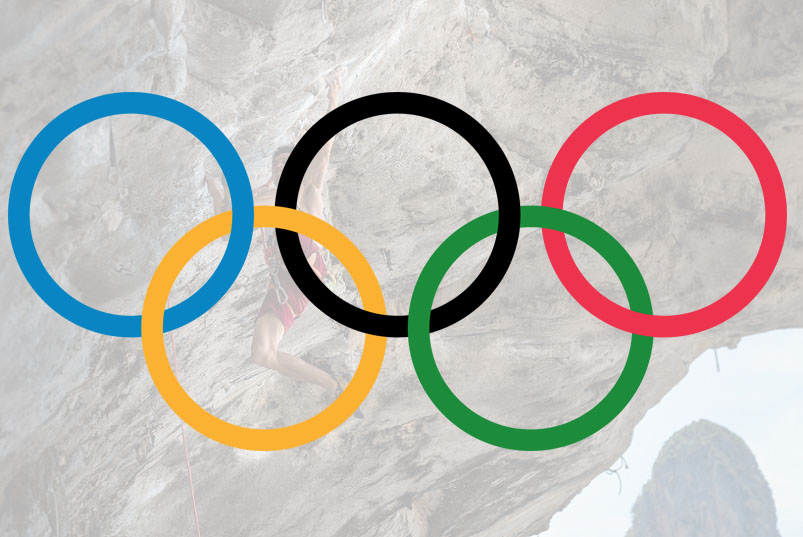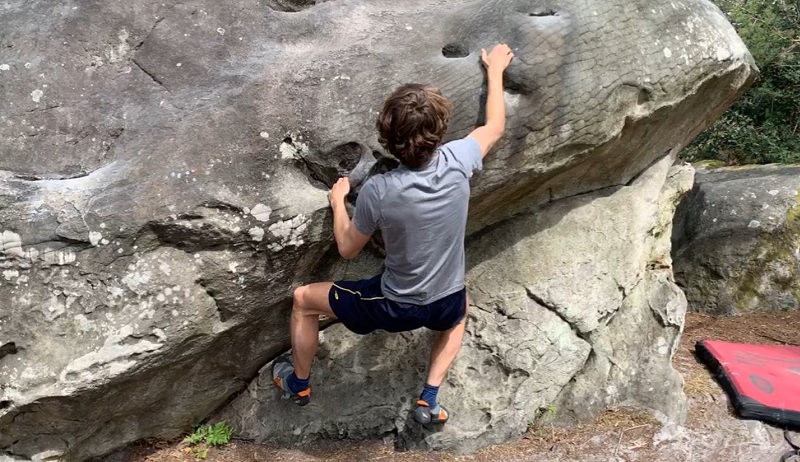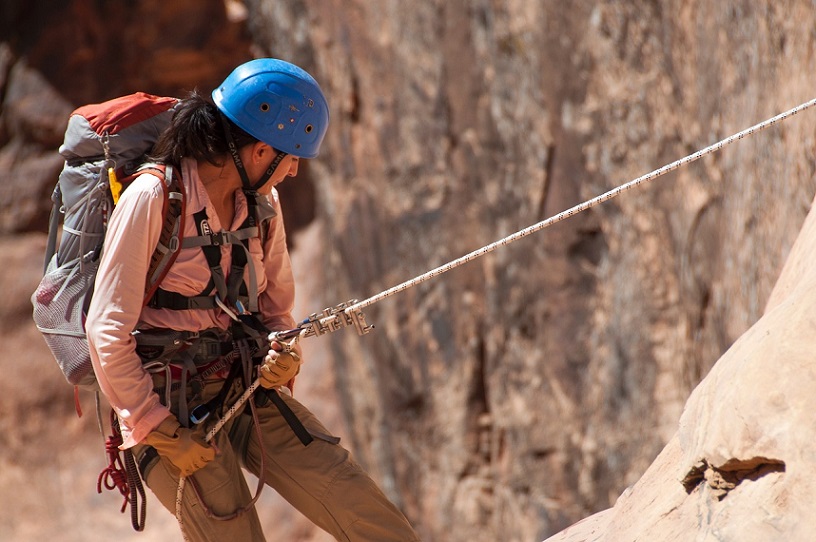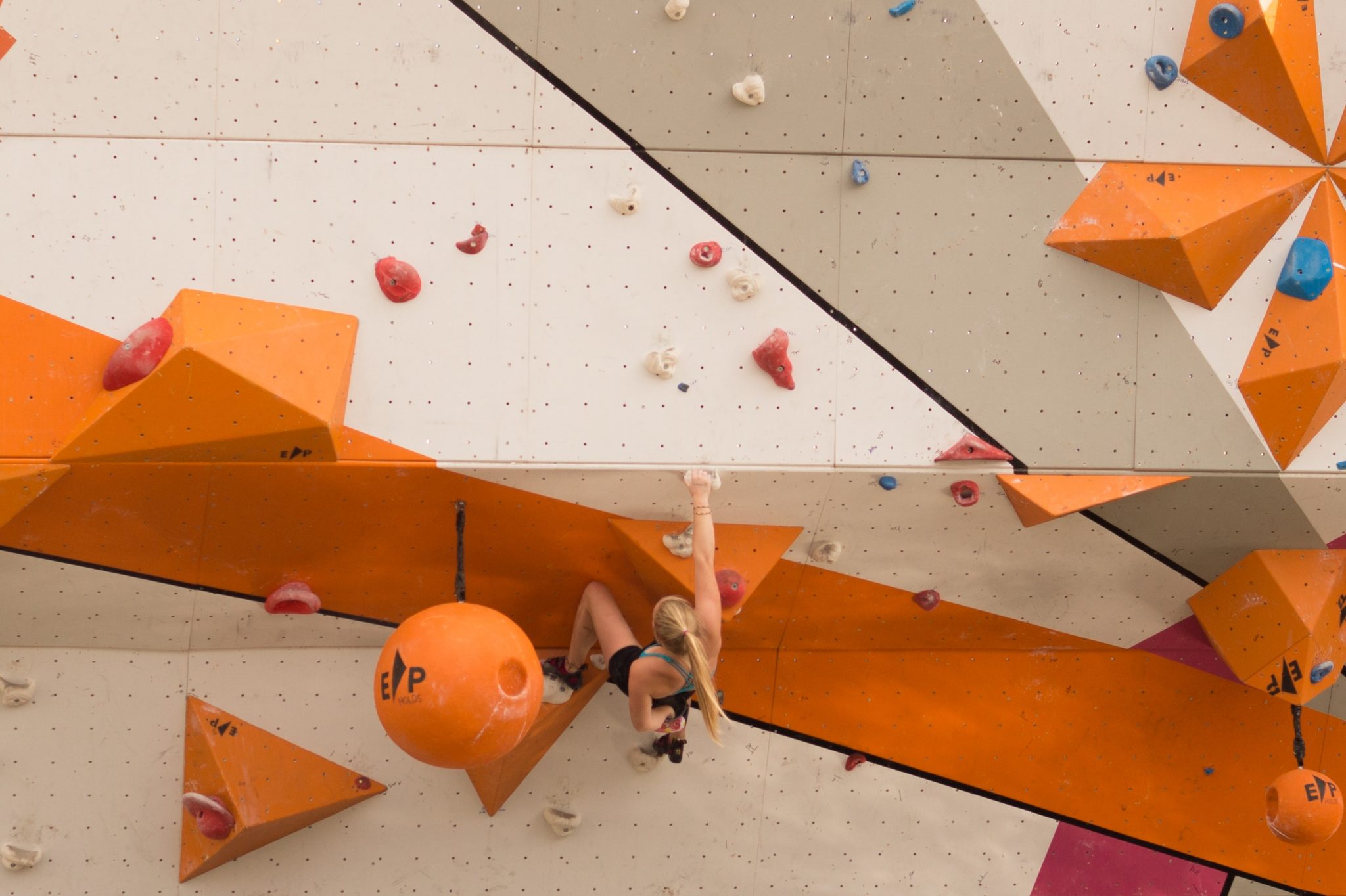Climbing has gained the recognition of the Olympic committee and is now officially an Olympic sport. It will debut at the Olympics in 2020 in Tokyo.
Hoorah!
Right?
Well, Yes! The decision excites climbers around the world. But it has also raised some concerns and a bit of controversy within the climbing world.
For example: while the different swimming distances are each rewarded with their own medal, amounting to a staggering 18 medals for both males and females, the diverse sport of climbing, with its various disciplines, will only be rewarded with one medal per gender. This has forced the sport to make some difficult decision.
Generally, though, climbers are exuberant about the sport’s acceptance to the Olympics and so are we over at climbingblogger.com!
Here’s everything you need to know about climbing in the Olympics: from the kinds of climbing we’ll see at the Olympics and the controversy this has caused, to how the rating system will work and who will compete.

What kind of climbing will we see at the Olympics?
The three subdisciplines of climbing that we’ll be able to enjoy at the Olympics are:
- Speed climbing
- Lead Climbing
- Bouldering
As I just said, the choice for these three disciplines has led to some controversy. In particular the way each of these disciplines contribute to the overall score has raised one or two eyebrows of climbers.
You see, to the outsider, climbing may look like a homogenous sport. In reality, however, there’s a whole spectrum of types of climbing one can do, and only few climbers do them all.
In the current Olympic format, climbers are expected to compete simultaneously at all three of these climbing types. It’s almost like asking an Olympic swimmer to participate in a triathlon. Sure, the athlete may be great at one of the three compartments of the competition, but having to perform in all three is asking a lot of the climber.
“Having climbers do speed climbing, lead climbing and bouldering – it’s almost like asking an Olympic swimmer to participate in a triathlon.”
Let’s have a look at the three different disciplines of climbing:
Lead climbing at the Olympics
The oldest type of climbing is lead climbing. And so it is of no surprise that this discipline has been incorporated in the Olympic format.
The first competitions in lead climbing already took place in the 80’s. In lead climbing, the main goal is to climb as high as possible within just 6 minutes of time.
It’s important to note that time doesn’t matter unless there’s a tie in how high climbers have gotten up the route. So if two different contenders both climb to the top of a route, who wins is determined by the time each of these contenders took to get all the way up.
If, on the other hand, one climber gets to the 21th hold in 6 minutes, while another climber reaches the 20th hold in 5 minutes but cannot get to the 21th hold, the competitor who reached the 21th hold wins.
Being able to climb efficiently is probably the most important skill in all of lead climbing. Lead climbing usually happens on a 15 meter wall with at least 7 meters overhang. The Olympics won’t be an exception to this.
Summary
- 15 meter wall
- 7 meters overhang or more
- Distance climbed is more important than speed
- 6 minutes to climb as high as possible
Bouldering at the Olympics
In the late 90’s bouldering broke into the world cups and it is theby the youngest climbing discipline of sport climbing.
Bouldering competitions typically put a 4-5 minute time limit on the completion of a specific bouldering problem.
The goal in bouldering is to complete as many problems as possible using as few attempts as possible. The modern style of bouldering requires a lot of power and a wide set of skills, including dynamic moves, as the sport has evolved from clinging on to small crimps to jumping to and from big volumes.
At the Olympics, climbers will be challenged to complete three bouldering problems each within 4 minutes of time, armed with only their rock climbing shoes and chalk.
Summary
- As many problems as possible
- As few attempts as possible
- 4 minutes time per problem
- 3 boulder problems total
Speed climbing at the Olympics
And lastly there’s speed climbing, where the quickest ascension as possible is the ultimate goal.
All holds on the wall are standardized. This means that no matter where in the world you climb a speed route, the route will be exactly the same.
That’s also why it’s possible at all to have a speed climbing record. The current world record in speed climbing is about 5,5 seconds. That’s and insane time, because the wall is 15 meters high and it is overhanging at 5 degrees. So it’s going to hard to break it at the 2020 Tokyo Olympics, but with the current level of excitement amongst the competing climbers, everything is possible.
As you can imagine by the world record, the discipline of speed climbing requires an insane amount of athleticism. Imagine climbing 3 meters per second on a vertical wall that’s slightly overhanging. I know I can’t do that!
Summary
- Standardized holds / route
- 15 meters high
- 5 degrees overhang
- Only time matters
- Two tries to set your best score
- Current record held by Reza Alipour, at 5.48 seconds
The decision of the IFSC
So the climbing world was exuberant when climbing was first nominated and later approved to be an Olympic sport at the summer games.
The Olympic Committee gave climbing only one set of medals: one for men and one for women.
It was then up to the IFSC to decide which of the three disciplines to propose as an Olympic sport. The federation, interestingly, then proposed a combination of all three (!).
Many climbers thought the format was somewhat unfortunate.
A lot of climbers that climb real rock never really cared much for speed climbing. They’re not necessarily concerned with completing a climbing route within a short amount of time, rather, they focus on climbing it safely and with proper technique. They love the fact that every climbing route is different.
Still, the climbers that are preparing for the Olympics seem to make do with what we have been given and are excited overall.
Perhaps as climbing debuts at the Olympics and many people will see how cool of a sport it is, eventually climbing will get a medal for each of the subdisciplines. Can’t have it all at the first shot!
How the Olympic Climbing Qualifications work
During the Olympics in Tokyo, 20 men and 20 women will compete.
The top 8 climbers with the lowest score will advance to the finals.
The event will start with a qualification format for all 3 disciplines. First, they get 2 tries to set their best time in speed climbing.
Then, there will be a qualification format for bouldering, where climbers have to complete 5 problems, each in under 5 minutes.
Lastly, there is lead climbing. Two routes will be climbed in a flash style. There won’t be the usual isolation zone, where climbers wait in a different room so that they can’t see eachother climbing and learn the right beta before trying it themselves. Instead, in order to eliminate the disadvantage of going out first, there’s a video observation.
After climbers have completed all three formats, they have a ranking in each of them.
To determine which 8 climbers qualify, the same formula is used that they use to select the medalists after qualification:
How points are earned in Olympic climbing
The IFSC has made an incredibly interesting choice regarding the rating system. One would perhaps expect that all the points earned in the three disciplines would be added to each other to get to the final score.
This is not the case.
Instead, the rankings are MULTIPLIED.
Then, the LOWEST score wins.
This means that the rating system is really forgiving for being bad at one discipline, as long as you excel at at least one of the others. Being an all round good climber at all three disciplines, is punished. This has led to mixed reactions.
Let’s take a look at some examples to get a better grasp of what it takes to win at the olympics in climbing:
Example #1:
- 1st in Lead
- 10th in Bouldering
- 20th in Speed
Here, your final score is 1 x 10 x 20 = 200 points.
Example #2:
- 10th in Lead
- 10th in Bouldering
- 10th in Speed
Here, your final score is 10 x 10 x 10 = 1000 points.
While this score is in a way just as average as the score in the first example, you can see that your points are 5 times less favorable, because you did not become first at one of the subdisciplines.
Example #3:
- 1st in Lead
- 20th in Bouldering
- 20th in Speed
In this case, your score would be 1 * 20 * 20 = 400 points.
Conclusion
As you can see, a climber who performs the worst at two disciplines but wins at the remaining one, beats the climber that performs average on all three types of climbing.
So what would you do if you were competing in the Olympics? Would you focus all your training on one of the three types of climbing and try to win at it? Or would you train for all three? Or would you adopt a mixed strategy?
This is a question a lot of olympics climbers are currently struggling with. We wish them good luck in their training!
Related questions:
Here are some questions people also ask that read this article.
Is climbing an Olympic sport?
Yes, climbing is an Olympic sport starting in the year 2020 at the Olympic games in Tokyo!
Will the crags get overcrowded as climbing becomes more popular due to the Olympic expose?
It’s hard to say at this moment. It is, however, clear that climbing will very likely gain more attention. The new climbing enthusiasts will probably first be seen at the indoor climbing gyms before starting to hit the crags.
Is Alex Honnold competing at the olympics?
No, Alex Honnold is currently not competing in Olympic climbing.
Is Adam Ondra competing at the olympics?
Yes, Adam Ondra is training hard to compete at the Olympics. He also documents his training journey in his series ‘Road to Tokyo’, which can be seen here:






